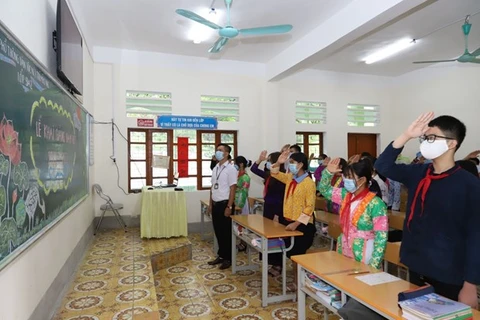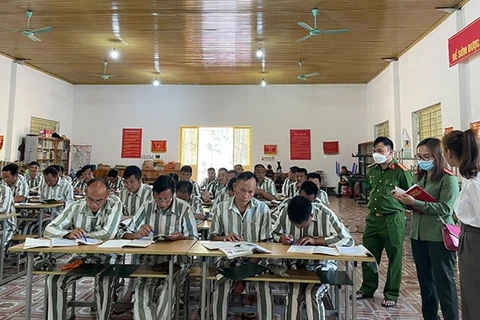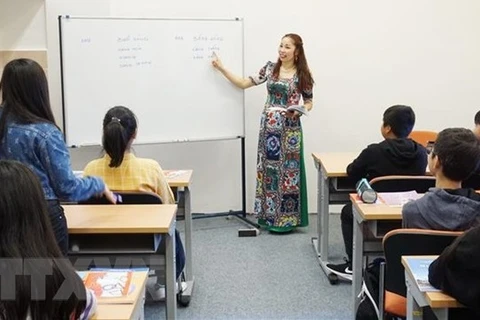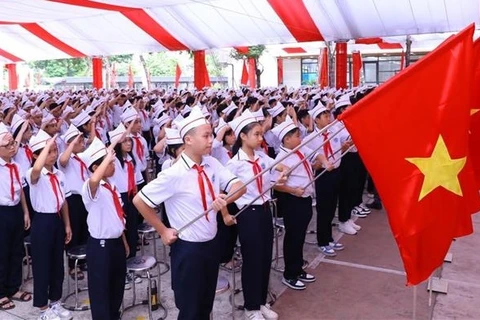 An illiteracy eradication class. All the 63 provincial-level localities nationwide have reached Level 1 of illiteracy elimination. (Photo: VNA)
An illiteracy eradication class. All the 63 provincial-level localities nationwide have reached Level 1 of illiteracy elimination. (Photo: VNA) The International Literacy Day is observed on September 8 every year.
In Vietnam, the literacy rates at Level 1 (completing Phase 1 of the illiteracy eradication programme and engaging in continuing education after acquiring literacy skills) and Level 2 (completing Phase 2 of the illiteracy eradication programme and engaging in continuing education after acquiring the skills) among people aged 15 - 60 currently stand at 98.85% and 97.29%, respectively.
All the 63 provincial-level localities nationwide have reached Level 1 of illiteracy elimination while 48 of them (76.19%) reached Level 2. Four provinces achieved Level 2 in the 2022 - 2023 academic year, namely Phu Yen, Kien Giang, Soc Trang, and Quang Nam.
Meanwhile, more than 1 million people aged 15 - 60 remain illiterate at Level 1 and over 2 million others illiterate at Level 2, mostly ethnic minority people and women.
Some localities still record high illiteracy rates such as Ninh Thuan (10.52%), An Giang (7.3%), Lai Chau (6.11%), Ho Chi Minh City (6.45%), Ha Giang (4.58%), Gia Lai (4.49%), Bac Kan (4.45%), and Binh Phuoc (3.66%).
During the last academic year, more than 32,000 people were enrolled in illiteracy eradication classes, rising over 12,000 from the 2021 - 2022 school year. That helped the country sustain its achievements in this regard, according to provincial-level departments of education and training.
The Ministry of Education and Training (MoET) reported that to sustain the achievements and help more localities meet Level 2 of illiteracy eradication, during the last school year, authorities of many provinces and cities ordered community learning centres and primary schools to encourage those unable to read or write to enroll in illiteracy eradication classes, including Ha Giang (5,897 persons), Lai Chau (5,176), Lao Cai (2,325), Yen Bai (2,088), and Son La (2,303).
 An illiteracy eradication class in Bang Phuc commune of Cho Don district, the northern mountainous province of Bac Kan (Photo: VNA)
An illiteracy eradication class in Bang Phuc commune of Cho Don district, the northern mountainous province of Bac Kan (Photo: VNA) Some education departments have also properly carried out communications about illiteracy eradication in the public, especially ethnic minority areas.
As a result, achievements have been maintained sustainably and seen more progress, the MoET noted.
For the 2023 - 2024 school year, one of the focal tasks the MoET has assigned to continuing education agencies is to push ahead the elimination of illiteracy.
To improve people’s educational level to help with poverty reduction, the MoET said, it is necessary to boost assistance and provide favourable conditions for vulnerable groups, those out of the working age, homemakers, and the disabled to practice lifelong learning. Examples of older persons who are in their 60s, 70s or even 80s should be popularised to encourage lifelong learning in society.
The MoET has launched a movement for the 2023 - 2030 period that calls for the entire country’s joint efforts in building a learning society and promoting lifelong learning. The programme aims to help increase the whole political system’s participation in raising public awareness of lifelong learning and a learning society, thus contributing to the development of human resources amid the Fourth Industrial Revolution and international integration./.
VNA























